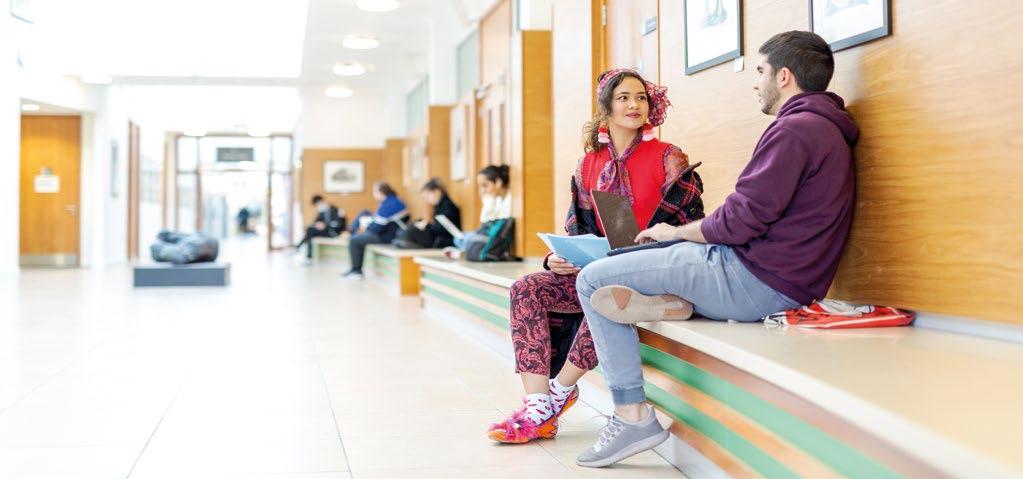
7 minute read
Global impact
Supporting your studies As a Durham student, you’ll find an extensive and helpful support network.
Your first point of contact will be your College Student Support Office, who can direct you to a range of professional services and experts to ensure you get the help, support or advice you need.
Counselling
Throughout your time with us, you’ll have access to our Counselling Service. Whatever you might be going through, our team of trained and experienced counsellors, psychological wellbeing practitioners and mental health advisors will be on hand to offer you support and share their expertise.
To find out more, see durham.
ac.uk/counselling.service Health and Wellbeing
A healthy lifestyle and overall sense of wellbeing will help ensure that your time here is the best it can be. Our Student Wellbeing Office runs a proactive student wellbeing programme of activities, events and campaigns. The Office also oversees the University’s Chaplaincy and Faith provision.
To find out more, see durham.
ac.uk/experience/support
Disability Support
Whether you’ve got a disability, a medical or mental health condition, or a specific learning difficulty, our specialist Disability Support Service will be on hand to offer advice and guidance. You’ll receive a Disability Support Notification, outlining the support you’ll need to ensure that you can fully engage with your studies and live at the University. It’s important to let us know your requirements when you apply so we can make sure we’ve got the appropriate support in place before you start your course.
To find out more, see durham.
ac.uk/disability.support Chaplaincy and Faith Support
We’re proud to be a multicultural, multi-faith community. We celebrate our differences and firmly believe they make us stronger. Our Network of University Chaplains is committed to welcoming and supporting students of all faiths, and those of none. We provide dedicated facilities for our main religious communities, including prayer rooms, events and societies, single-sex accommodation, and kosher and halal dining. If you have any special requirements related to your faith, please let us know.
To find out more, see durham.
ac.uk/faithsupport Supportive environment
Our Student Support services are located at the Palatine Centre.
Childcare
At our day nursery we aim to provide high-quality childcare in a safe, secure and stimulating environment for children aged 0 to 5 years.
To find out more, see durham.
ac.uk/university.nursery
For a list of local primary and secondary schools and information on applying for a place for your child, see
durham.gov.uk
Support for Autistic Students
We are a partner in the autism@uni initiative, which aims to assist autistic students in their higher education transitions. Our dedicated web page provides a toolkit to help you through all stages of applying to, studying at and progressing from university.
To find out more, see durham.
autism-uni.org Immigration Support
Our Student Immigration Service provides information and advice if you need a Student visa (or you already have immigration permission) to study in the UK. If you need a Student visa to study in the UK, you’ll receive a Confirmation of Acceptance for Studies (CAS) (a unique reference number) from the University Admissions team after you’ve received an unconditional offer. You can then use the CAS to apply for a Student visa and we provide details of the application process and requirements, as well as anything else that you may need to consider. When you arrive in Durham, you’ll be asked to compete a Right to Study check (to ensure you have the correct visa or immigration permission to study at Durham) as part of the registration process, before you start your course. We’ll support you throughout your stay in Durham if you decide to make changes to your course that may affect your visa, you need extra time to complete your course or you’re thinking of inviting family to join you or visit, plus many more issues. We’ll also provide information about how to protect your visa if you decide to work while you study and options for working after you’ve completed your course, including under the Graduate Immigration route.
For details of the visa process and requirements, immigration updates and latest news:
durham.ac.uk/study/ international/visa-information Healthcare in the UK
If you apply for a visa to stay or study in the UK for longer than six months, you’ll be required to pay an Immigration Health Surcharge (IHS) in addition to the application fee, when you apply. How much you’ll pay depends on the length of your course. Once you’ve paid the IHS you’ll be entitled to use the National Health Service (NHS) without charge during your stay in the UK (although some services may still require payment). This also applies to any family you have with you that have applied for permission as your dependants (and also paid the IHS). Students who are not required to pay the Health Surcharge should take out comprehensive health insurance to ensure that adequate cover is in place before travelling to the UK.
To find out more, see durham.
ac.uk/study/international/ visa-information
Managing your money Here is what you are likely to spend money on – and how to reduce those costs!
From tuition fees to college costs, entertainment to travel, costs of studying and living away from home all need to be considered and budgeted for. This guide will give you an idea of what you might need to spend your money on and how much.
Tuition fees
Our undergraduate tuition fees for international students in 2022 will range from £21,500 a year to £27,300 depending on the course chosen.
For postgraduate taught courses, tuition fees range from £21,750 up to £35,000 per year for the MBA.
Postgraduate research will cost from £22,750 per year.
Accommodation
Whether you choose to live in college or rent from a private landlord, you’ll need to cover the cost of your accommodation as well as any bills and other fees.
College fees
College fees usually range from £5,662 to £11,908, depending on whether you choose catered or self-catered accommodation, a single or shared room, and whether you opt for an ensuite or shared bathroom facilities. All bills are included in your college fees. Remember – if you’re living in a self-catered college, you’ll need to budget for the cost of your meals. As a rough guide, our current students spend up to £40 a week on food.
Rented accommodation
Of course, not all students live in college. If you choose to live in rented accommodation instead, you’ll need to factor in rent, utility bills and food costs.
Entertainment
Here are some typical costs of activities in the city:
• Cinema tickets – approximately £5 • Durham Student Theatre – tickets for students approximately £5 • Meals out – students can dine for as little as £5–£10 with student discounts in local restaurants and bars.
Gym
Many of our colleges have their own gyms or you can enjoy our recently modernised Maiden Castle gym for £150 a year.
Travel
Durham is small so you can walk everywhere but if you use the train fairly regularly over the year, it’s worth buying a 16–25 Railcard to save a third on rail fares when you’re exploring the UK or visiting friends.
#1
Use your own cup and save 20p on coffee – it’s better for the environment and your bank balance. Or, fill a flask and take your own.


#5
Check what books on your reading lists are available in the library before buying your own copies.
#2
Save your mobile data by using the free WiFi that’s available across campus and in the colleges.
#3
Lots of the city’s attractions are free for students – look out for special deals at Durham Castle, Cathedral, the Botanic Garden, and Oriental Museum.
#4
Make the most of student discounts! Always ask at the checkout when you are shopping whether they offer student discounts and look out for discounts online too.
#6
Avoid wasting food! Plan your meals before you do your shop to avoid overbuying and remember to take your own bag to save buying plastic bags at checkout.
#7
Try shopping at charity shops for pre-loved or vintage clothes – they’re much cheaper and better for the environment. And they are good for fancy dress too!


Clothing and toiletries
Remember to budget for clothes and toiletries, especially as the weather will change with the seasons!
Mobile
A mobile phone contract typically costs between £10 and £50 a month depending on what type of phone you opt for and how many minutes and texts you need.
Books and stationery
You’ll need to factor in costs for books, printing and stationery.




